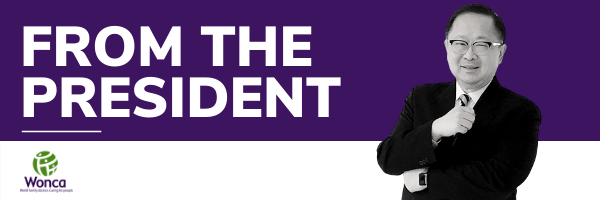From the President: March 2021
 Español Français 中文
Español Français 中文
As the governments of wealthier countries discuss the logistics - and the moral compulsion - to share COVID-19 vaccines with poorer countries and as the vaccine is increasingly delivered around the world, we can begin to look at what the next phase of our lives might be like. They will not go back to what they were before COVID-19 but we might be able to retrieve a semblance of what we consider to be ‘normal’.
Over the last year, all of our lives have been challenged, professionally, socially and, for many, personally. And yet, our innate desire to try to maintain a semblance of normality is very strong in each of us. In the context of WONCA, one of the things which has amazed me over the last year is the enthusiasm by our regions, our Working Parties, our Special Interest Groups and our Member Organisations to continue to hold conferences and meetings. Just over recent weeks, we have had WONCA Europe, the Royal Australian College of GPs, the RCGP UK, the WWP on Rural Health and the Philippine Academy of Family Physicians holding successful and well-attended conferences.
Many of these conferences are, to some extent at least, interactive, with side events, voting systems and Q&A sessions. Some of the sessions are streamed live; others pre-recorded. Timing, of course, is a challenge, when participants are living and working in multiple time zones. But the thread is the same: family doctors across the world are keen and enthusiastic about building and sharing knowledge; about meeting and refreshing relationships with their global colleagues and friends, albeit virtually.
Of course, during the last year we have all had to learn new skills, or expand those we had rarely used since our days as medical students; or develop skills in accessing and using technology to provide a better service to our patients. After the worst of this pandemic has passed and we are on a more positive trajectory, these refreshed or new skills will continue to stand us in good stead. Our ‘new normal’ will include the best of what we have learned.
In general practice and family medicine circles, the skills of managing patients with co-morbidities are very normal, entirely usual. But we forget that this is not the case for many clinical specialists. The issues around co-morbidities, such as diagnosis, treatment protocols, consequences, vulnerabilities, contra-indications, poly-pharmacy – all of these are part of our day-to-day toolbox of family medicine. We are trained and skilled in treating our patients as whole people rather than a set of individual clinical signs and symptoms. One of the issues, which hospital treatment of patients with COVID-19 has brought to the fore, is how crucial it is for the whole range of clinical specialists to know and understand, at least to some extent, the implications of multi-morbidity in our patients and to understand the implications of recovery from the most serious impacts of the virus.
For those who have successfully recovered from the worst effects of the virus, a long road to recovery is ahead. Family doctors will be crucial in supporting and contributing to the research needed to help us all understand the long-term implications of recovery. Some of the challenges are already becoming clear: chronic fatigue, lack of concentration, survivor guilt, to name very few. It is after the drama of hospital care, crucial as it is, that family doctors will pick up the pieces of their patients’ lives, to help them move towards as good a new ‘normal’ as can be achieved. With the continued sharing of our knowledge, through our conferences, Working Parties and Special Interest Groups, we are able to ready ourselves for the primary care implications and challenges to come.
(PS Last month I thanked the Cross Straits Medical Association for undertaking the Mandarin translation of my columns. This month I would like to thank Julien Artigny, who is a member of our LGBTQ SIG, for agreeing to do the French translation of my column)
Donald Li,
President